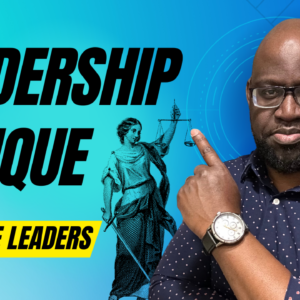
How to Leverage Emotional Intelligence in Leadership
Emotional intelligence also called emotional quotient (EQ), is the ability to recognize and perceive one’s own emotions and therefore the emotions of others. It involves the flexibility to manage and regulate your emotions, as well as the ability to use emotions to make choices and solve problems. [Triple Crown Lradership]
This quality is an essential attribute that leaders must possess, as it allows them to communicate effectively with and perceive their team. It also helps leaders make higher choices, resolve conflicts productively, and encourage their teams. Studies have shown that leaders with high emotional intelligence typically measure up an additional Triple Crown and have additional positive relationships with their team members. In fact, emotional intelligence was found to be a stronger predictor of success in leadership roles than IQ or technical skills.
In today’s fast-paced and perpetually dynamic business world, it is more necessary than ever for leaders to have the flexibility to navigate complicated social situations and effectively manage their own emotions and therefore the emotions of their team. Emotional intelligence helps leaders create a positive and productive work environment, which is important for the success of any organization.
The role of emotional intelligence in effective communication

Effective communication can be a key part of leadership, and emotional intelligence plays an important role in this. Leaders with this quality are able to perceive and respond to their team’s emotions, which helps to create an open and complete additional framework. This, in turn, will result in better communication and collaboration between team members.
This ability will improve communication within the organization by enabling leaders to effectively hear and perceive the issues and desires of their team. Leaders with this ability are able to tune in to the emotional cues of others and respond in a way that shows sympathy and understanding. This can create an atmosphere of trust and respect among team members, which is important for effective communication.
Another way emotional intelligence will improve communication is to help leaders communicate their own emotions effectively. Leaders with this quality are able to specify their emotions in authentic and real ways, which can make it easier to build trusting relationships with their team. This can be especially necessary in times of change or uncertainty, once clear and effective communication is crucial to maintaining team cohesion.
Overall, this approach plays an important role in effective communication by helping leaders grasp and respond to their team’s emotions, and express their own emotions in authentic and real ways.
The impact of emotional intelligence on decision-making

This approach plays a big role in how leaders make decisions. Leaders with this ability are able to recognize and understand their own emotions and therefore the emotions of others, which can help them build informed and balanced alternative choices.
One of the ways that emotional intelligence will influence decision-making is to help leaders contemplate the perspective, and emotions, of others. Leaders with this quality are able to reflect on their team’s emotions and desires once they have expressed choices, which can lead to simpler and more cooperative solutions.
Another way emotional intelligence will impact decision-making is to help leaders manage their own emotions. Leaders with high emotional intelligence are able to regulate their own emotions, which can help them assume more clearly and rationally once their choices are made. this may be especially necessary for very stressful things, once emotions cloud judgment.
Overall, emotional intelligence helps leaders build higher choices by allowing them to contemplate the opinions and emotions of others and by helping them manage their own emotions.
Here are examples of how emotional intelligence will influence decision-making within the organization:
- A leader in this approach is able to focus on their team’s problems and concepts once they choose a whole new project strategy, which leads to an additional cooperative and effective response.
- These leaders are able to control their own emotions once faced with a difficult situation, allowing them to clearly and rationally assume and build a solution and approach that is in the best interest of the team and therefore of the organization.
- These leaders are able to contemplate the emotions of their team once he has created changes in company policies, resulting in a major transition and a significant moral and emotional impact on the Members of the team.
The relationship between emotional intelligence and conflict resolution
Conflict resolution is an essential part of leadership, and emotional intelligence plays an important role in this method. Leaders with high emotional intelligence are able to recognize and perceive the emotions of those involved in a conflict, which can help them reach an honest and unbiased resolution.
This approach will help leaders resolve conflict by enabling them to speak effectively with the people involved. Leaders with high emotional intelligence are able to understand the issues of all parties involved and respond with a method that demonstrates empathy and understanding. This can reduce and even erase diffuse tensions and create an additional productive framework to ward off conflicts.
This quality can also aid in conflict resolution by helping leaders manage their own emotions. Leaders with high emotional intelligence are able to regulate their own emotions and remain calm and down-to-earth once they are
faced with a conflict, which can help prevent anger, and allow them to avoid escalating the situation.
Overall, this approach plays an important role in conflict resolution by helping leaders speak effectively with those involved and manage their own emotions.
However, examples of emotional intelligence that are often used to resolve conflict within an organization include:
- A leader with high emotional intelligence is able to focus on the issues of 2 team members involved in the conflict and facilitate productive verbal communication that results in an unbiased resolution.
- A leader with high emotional intelligence is able to remain calm and down-to-earth once faced with a difficult scenario, which helps prevent the conflict from escalating and allows for further productive resolution…
- A leader with high emotional intelligence is able to recognize and perceive the emotions of those involved in a conflict and use this understanding to facilitate an honest and unbiased resolution.
The links between emotional intelligence and motivation
This approach plays a big role in leaders’ ability to encourage their teams. Leaders with high emotional intelligence are able to perceive and respond to their team’s emotions, which can help create a positive and productive work environment that contributes to motivation.
This quality will help leaders encourage their team by enabling them to effectively communicate with and perceive their team’s demands. Leaders with high emotional intelligence are able to hear their team’s problems and desires and respond to them in a method that demonstrates sympathy and understanding. this can ease the path of trust and respect between team members, which is important for motivation.
Another way emotional intelligence will improve motivation is to help leaders create a positive and inclusive work environment. Leaders with high emotional intelligence are able to produce a culture of quality and inclusiveness, which can aid in team member morale and motivation.
Overall, this approach helps leaders encourage their team by getting them to communicate effectively with and perceive their team’s demands, and by helping them create a positive and inclusive work environment.
Here are some examples of emotional intelligence that will improve motivation within the geographic point:
- A leader with high emotional intelligence is able to focus on their team’s issues and concepts and respond in a way that demonstrates sympathy and understanding, which helps build team morale and motivation. Members of the team.
- A leader with high emotional intelligence is able to create a positive and inclusive work environment that fosters collaboration and innovation, which helps to encourage and interact with team members.
- A leader with high emotional intelligence is able to recognize themselves and respond to their team’s emotions in a way that helps create an atmosphere of trust and respect, which can increase motivation and productivity.
Conclusion
In conclusion, emotional intelligence can be a crucial attribute of leadership. It enables leaders to communicate effectively with and perceive the demands of their team, build higher choices, resolve conflict productively, and encourage their team.
Leaders who possess high emotional intelligence are usually an additional resource, as they maintain additional positive relationships with their team members.
Emotional intelligence was found to be a higher predictor of success in leadership roles than IQ or technical skills.
Given the importance of emotional intelligence in leadership, it is necessary for leaders to actively work on developing their emotional intelligence. This can be done through activities such as emotional intelligence coaching, seeking feedback from team members, and active self-reflection and awareness.
By developing their emotional intelligence, leaders will create an additional positive and productive work environment for themselves and their team, which is important for the success of any organization.










